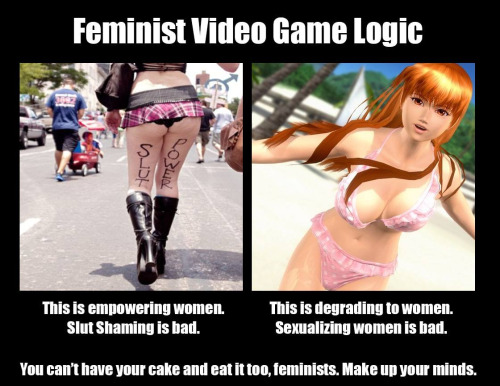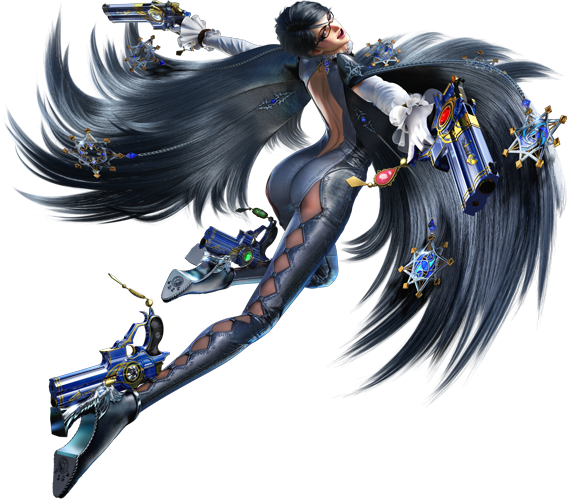Uncategorized
Why Gamers Need Feminism: Objectification and Power Fantasies
Discuss this post in The Guild Hall!
So, I figured it’s been a few weeks, let’s revisit this topic. The first post in the Why Gamers Need Feminism series was sort of a broad overview. It sparked a lot of conversation over in The Guild Hall, and I wanted to take some time to drill down on a theme that came up a few times, namely, objectification and power fantasies.

Frequently in the discussion the idea of “sexy” characters came up. Whether or not it was sexist for a female character to be sexually attractive and/or wear revealing clothing. How much was “too much.” If it was acceptable for companies to make female characters’ outfits more revealing to drive sales or appeal to the fanbase. Now, obviously there’s the argument made for that last one that games are made to make money, and if they don’t make money the companies go under. But, I think something worth thinking about is whether it’s acceptable to make more money by pandering to sexism, or if it’s a morally better choice to not pander to the sexism as long as you’re already making enough money.
Beyond that, though, the idea of “sexy” characters must be looked at from two different perspectives: practicality, and intent.
For instance, we talked about skimpy armor for women in games. Now, obviously, skimpy armor is meant to look sexy, and entice people looking at the character who would be into such things. Also obvious is the fact that not all games have realistic armor, and that some games also stick men in skimpy armor and outfits (though not very many.) However, a quick litmus test is to look at how males in the game are dressed compared to females. If the guys are all running around in flak vests and balaclavas, and the girls look basically the same except they’ve got a boob window to show off their cleavage, yes, that’s sexist. Its only purpose is to enhance sex appeal, and would actually be a hindrance in combat.
Now, if we leveled the playing field and gave all the guys in the game butt windows, and gorgeously sculpted glutes to go along with them, then we might be having a different discussion. At least then one could make the argument that everyone is being objectified relatively equally. But what if we weren’t to objectify them at all? What if, this is shocking, I know, but what if in our realistic military shooter game, everyone just wore realistic military clothes, regardless of their gender?
But here’s the thing: Sexy does not have to mean objectified. Sexy can be a strength, or a weakness of a character, but it does not have to mean that character exists primarily for the sexual pleasure of the players. Let’s talk about Bayonetta for a second.

Now, she’s in that tight leather getup, with those curves and that innuendo, and your first thought might be totally sexist, right? But here’s the thing: Bayonetta is actually a pretty powerful case for feminism in gaming. She’s a kickass female protagonist, but on top of that she’s a kickass female protagonist who uses her sex appeal as a weapon. She owns her sexuality, and makes it intrinsically a part of herself.
Women can and do have sexual power fantasies, just like men do. The “alpha male, everyone wants to sleep with me” character is definitely a male power fantasy, but the “alpha female, everyone wants to sleep with me” character can be a female power fantasy, too. The different between being powerfully sexy, or being objectified comes down to the intent, and the situations the storyline puts the character in.
When Hideki Kamiya, the creator of Bayonetta found out there was send-up porn being made of her, he was upset. Now, you may find that silly, everyone knows that porn is made for basically every character out there (helloooo rule 34,) but the reason that Hideki was really unhappy about it was because the comics that featured her weren’t really true to Bayonetta’s story. They put her in compromising, mostly submissive sexual situations, and he created Bayonetta to be a dominant, sexy, powerful woman. That’s the difference that intent can make, as well as story execution.
For a counter to this, look at Tifa, from Final Fantasy. Tifa is, unfortunately, not a great example of a powerful feminist character.
“But Dan!” you might say, “Tifa’s super strong and stuff, and she beat bad guys up, and she really helped with the plot!”
It’s not because she’s got giant boobs, or revealing clothes, though those help contribute to it. It’s the fact that she’s got those, and they don’t enhance her character in any way. It’s that she’s a powerful character, but her only real contribution to the storyline of the game is just supporting Cloud, the main protagonist. When Cloud gets all mopey on himself, Tifa basically turns into a glorified counselor and cheerleader.
Should Tifa not support her friend in his darkest times? Of course not. But with as strong, and capable as Tifa could be, as soon as Cloud is out of commission she basically turns into the worried housewife. What could have been a brilliant moment of character development instead was basically just, “Well, better get Cloud back to 100% ASAP so my man can protect me.”
Now, of course, that’s a bit unfair, and I know I’m on sacred ground here because FF7 is basically Square’s gift to humanity in many gamers’ eyes. However, it’s just a small example of what happens on a MASSIVE scale in gaming. Way more often than should be, female characters’ main purpose in a game is A) Look pretty and B) Support the man.
How does this all relate to Gamers needing feminism? Well, we’re at a pretty nascent stage of games as far as being storytelling artistic mediums on par with movies or books. We’re starting to get there, for sure, but creating realistic, complex female relationships is basically opening up 100% more story potential. By relying so much on male protagonists and traditional 50s-era gender relationships, we’re missing out on at least half of the cool, interesting stories we could be telling!
I don’t know about you, but I love playing games with good storylines. In fact, there’s a very active thread about this going on over in the Guild Hall right now! I want more complex, interesting, awesome stories in games, and I think most people do! But, we need to bring our women out of the refrigerator, first.
So, to recap:
- Women can be sexy in games without being objectified. If you’re not sure if female characters are being objectified, look at their outfits compared to the male characters.
- Women can have sexual power fantasy, however the key word in there is power.
- Women having real character growth and reasons for existing opens up a whole bunch of storytelling opportunities that no one has taken yet, and that’s a whole bunch of games that I haven’t gotten to play yet that I really want to.
Disagree with me? Awesome. Let’s talk about it!
Live boldly, change the world, and continue to be awesome!
Dan “DaRatmastah” Wallace





Ouch. Jesus. When you drop the Mic, it makes an awful racket. Just put the Mic back on the stand after you drop some wisdom.
HAHAHA! Sorry, I’ll keep that in mind next time… >_>
Pingback: Top Three Reasons People Fail at Getting In Shape | Be a Game Character
“By relying so much on male protagonists and traditional 50s-era gender relationships”
There were always men and women, not only in the 50s but always. There are no other gender-relations.
And feminism is just an ideology which completely ignores that both genders make mistakes. Some female characters might be objectified but others clearly are not.
Gender relationships and interactions vary wildly from culture to culture, and through different eras. When I was referring to 50s era gender relationships I was referring to the relationship that existed between men,women, trans, queer, etc. that existed primarily back in the 40s and 50s.
Feminism is an ideology that says, among other things, that there should be equitable representation for all genders in culture/media. Currently, there is not. If you think that there IS, I would love for you to point me towards some studies that support that point, because I can definitely provide you with some that support my own point.